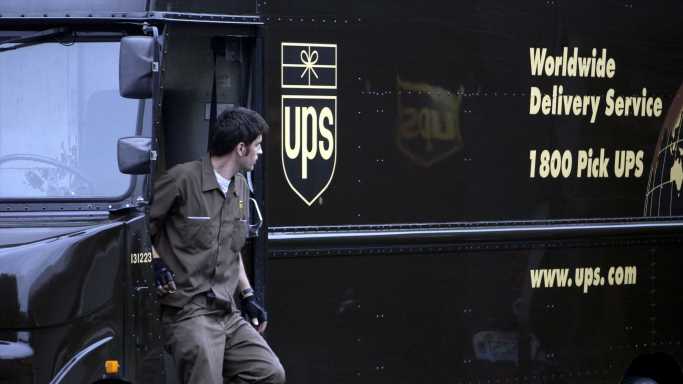United Parcel Service Inc. (NYSE: UPS) on Tuesday avoided what could have become one of the largest labor strikes in U.S. history if the 340,000 Teamsters Union members had walked off the job on August 1. UPS and the union agreed on a contract that still must be approved by a vote of union members.
That approval, while not guaranteed, seems to be in the bag. According to the union’s press release, the “overwhelmingly lucrative contract raises wages for all workers, creates more full-time jobs, and includes dozens of workplace protections and improvements.” It is hard to argue with any of that.
UPS has agreed to boost wages by a total of $30 billion, eliminate the hated two-tier wage system, establish the federal Martin Luther King Jr. holiday as a paid holiday, and make UPS drivers’ lives better by banning in-cab, driver-facing cameras, adding air conditioning or fans to delivery trucks and eliminating forced overtime.
Union representatives are scheduled to meet Monday to approve the tentative agreement, and union members will begin voting August 3 on the deal. Voting ends on August 22. If approved, the contract is good for five years.
Robert Reich, labor secretary under President Bill Clinton from 1993 to 1997 and currently a professor of public policy at Berkeley, commented:
Forty years of union-busting and trickle-down economics has made the rich richer, while eviscerating the American working class.
That’s why UPS workers fought back. And why over 320,000 other unionized workers across various industries have gone on strike so far this year. They are organizing to rebuild worker power and demand the pay and dignity they deserve.
Never forget this: Working people outnumber the billionaires and CEOs.
Reich, a labor historian, also noted the recent history of the labor movement in the United States:
Unfortunately, after decades of union-busting and so-called “right-to-work” states, only 6 percent of private-sector workers are unionized today. When I was a kid in the 1950s, a third of all private-sector workers were unionized.
Which goes a long way to explaining why in the three decades after World War II, America created the largest middle class the world had ever seen. And why, starting in the 1980s, that middle class has hollowed out — creating anger and anxiety that’s been channeled by cynical, power-hungry politicians into racism, xenophobia, and rage.
In a tweet/xeet last night, Reich also offered this nugget:
We might conclude that Reich thinks this might be a watershed moment for U.S. workers and a slap back at their bosses. So far in 2023, more than 320,000 American workers have gone on strike, the highest total in four years.
UPS stock closed down about 2% on Tuesday and traded flat in Wednesday’s premarket session. The $30 billion spread out over five years amounts to less than 4% of UPS’s current market cap. The labor agreement is hardly going to drive the company out of business or cause investors to flee in droves.
Defense contractor RTX Corp. (NYSE: RTX) reported better-than-expected earnings and revenue Tuesday morning that were undermined by the revelation that the company will have to recall at least 1,200 jet engines to check for a flaw caused by “a rare condition in powdered metal used to manufacture certain engine parts.” The flaw may reduce the life of those parts.
RTX, which not long ago was known as Raytheon Technologies, acquired the Pratt & Whitney jet engine business in its $135 billion merger with United Technologies (UTC) in 2020. The PW1100 geared turbo-fan engine is among the customer choices available to buyers of Airbus’s A320neo single-aisle jet. The engines being inspected were built between late 2015 and 2021.
On the conference call Tuesday, Chief Operating Officer Chris Calio said that RTX expects that about 200 engines will be removed from their aircraft by mid-September to undergo an accelerated “enhanced inspection.” Over the next nine to 12 months, RTX anticipates that about 1,000 more engines will need to be removed for inspection. The Wall Street Journal reported that the inspection of the first 200 engines will reduce RTX’s free cash flow by about $500 million.
RTX stock closed down more than 10% on Tuesday, wiping out about $14 billion in market cap.
Sponsored: Find a Qualified Financial Advisor
Finding a qualified financial advisor doesn’t have to be hard. SmartAsset’s free tool matches you with up to 3 fiduciary financial advisors in your area in 5 minutes. Each advisor has been vetted by SmartAsset and is held to a fiduciary standard to act in your best interests. If you’re ready to be matched with local advisors that can help you achieve your financial goals, get started now.
Source: Read Full Article
-
Oil Futures Shed Over 5% On Concerns Over Economic Slowdown, Demand Outlook
-
Intuitive Machines Makes Strong Lunge on Space Exploration Pivot
-
Q3 Earnings Season Starts With a Bang: Analysts Upgrade or Downgrade Apple, Opendoor, Petrobras and More
-
Airlines cancel, reroute flights during Chinese military drills near Taiwan
-
Goldman Sachs Spots One Red-Hot Sector With 5 Likely 2023 Winners Paying Big Dividends

